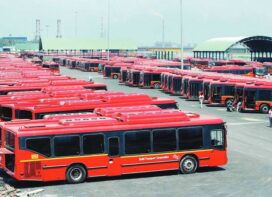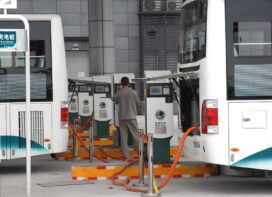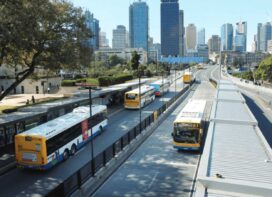
As India recovers from the impacts of the current epidemic, bus based public transport systems will play a vital role in building back the economy. For hundreds of people who suffered financially due to the nationwide lockdown, buses offer the only low-cost mobility option to access jobs, education and health care. However, the State Transport Undertakings (STUs) that operate public bus services in urban, rural and intercity segment have also faced colossal losses in the past few months and are struggling to recover.
STUs, whose main source of income is fare collection, are obligated to provide affordable services to ensure mobility for all. This means they earn little capital to cover costs involved in bus operations. Cost recovery varies between 47% in urban areas to 81% in intercity segment. This amounted to 16,409 crore loss for 54 STUs in 2016-17. Losses are not unique to Indian STUs and are witnessed by operators globally, as well as in other mass public transport modes. However, many are supported by regular government grants.

Head – Integrated Transport,
World Resources Institute India
In India, the finances of the STUs have taken a severe beating during this uncertain time. A comparison of pre- and post-lockdown operational costs and revenues of STUs in Delhi, Mumbai, Bengaluru, Ahmedabad, Pune, Chennai and Hyderabad demonstrates this. Public bus agencies in these cities earned almost no revenue during the lockdown, between March 25 and May 19, when only 2-3% of their fleet remained operational. In September, by when most of the lockdown restrictions were eased, these STUs were earning around 30% of the fare they used to collect before, due to physical distancing norms and reduced demand. However, during this time, STUs incurred around 60% of the pre-lockdown operational costs – staff salaries, government taxes and payment to private partners. Cumulatively, between March and September, STUs in these cities are estimated to have incurred losses of around `3400 crore. The losses are likely to be higher, as this estimate excludes expenditure on interest paid on loans and costs of fuel, bus maintenance and sanitization.
The unexpected losses have accentuated the recurring issue of operations of overaged fleet by STUs in absence of funds to procure new buses. Bengaluru redirected funds reserved for replenishing its existing overaged fleet to protect itself from the financial impact of Covid. For all STUs combined, the total losses will be enormous and are incurred at a time when there is already a deficit of 2.5 lakh buses in the country.

Senior Associate,
Sustainable Cities & Transport
It will take several months for bus ridership to return to pre-pandemic levels and with lesser revenue, losses will accumulate. Without external support bus services are bound to deteriorate. Some states have provided support: the Karnataka Government released 426 crores to STUs under its purview; Maharashtra and Karnataka have exempted them from payment of road tax for three to six months, the Delhi Government is introducing cashless ticketing in buses to instill confidence and attract passengers. However, more concerted efforts are required to ensure that bus services recover from the impact.
Long-term reforms, short term relief needed
Immediate financial support and long term policy reforms can help absorb the financial shock that STUs face today. The Governments can provide relief by way of one-time special grants and exemption from payment of taxes for 12-24 months. While special grants can help recover the unexpected losses in the past six months, exemption from tax payment can reduce financial burden in the long-term. For majority of STUs, taxes comprise close to 20% of their costs. Major share is formed by Motor Vehicle Tax, Passenger Tax and Excise Duty and Value Added Tax levied on fuel. The taxes paid by city bus agency in Bengaluru are greater than the losses. If taxes are exempted, STUs stand to recover the cost of operating buses from existing revenue sources to a great extent.
As one-time special grants cannot be sustained for longer periods, there is a
need for a long-term regular budgetary support that is greater in amount than the existing grants. STUs operating in Indian cites currently receive only 13% of their revenue as grants compared to transit agencies in London and Singapore who receive grants of up to 33% and 53% of their total revenue.
Financial support can be regularized by providing viability gaps funds (VGF) that covers the cost-revenue gaps based on system performance. Gujarat Government has instituted a scheme to provide VGF for urban bus services in the State. Regular support can make STUs financially independent, empowering them to improve their services and revenue. While financial support from the Government is necessary, STUs need to minimize the amount of funding required by generating revenue from non fare sources such as developing land for long-term benefits, terminal building rights, advertising, branding rights, parking, etc.
Additionally, easy-to-implement, quick-win interventions such as use of
technology and prioritization of buses on city roads can enhance operational efficiency and commuter experience. An 18-km dedicated bus lane implemented in Bengaluru increased bus ridership revenue and improved passengers’ travel and wait-times. Lastly, private sector can be engaged to increase bus capacity and fill the existing gaps in services through policy and support for city agencies.
 TrafficInfraTech Magazine Linking People Places & Progress
TrafficInfraTech Magazine Linking People Places & Progress


